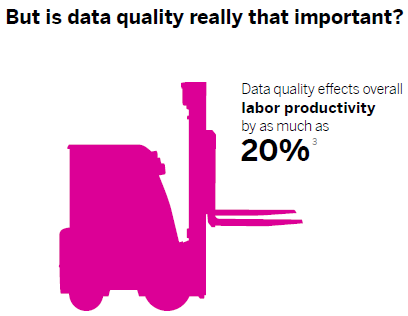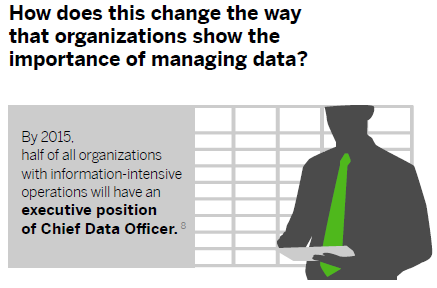Intrinsically, you know that you need good data. But how far do you need to go? What are the real costs incurred if you DON’T have clean data? Check out this new SAP Data Quality infographic, which highlights the probably extent of your data quality problems, and the costs associated with those problems.
We’re still making money, so how bad can it really be?
Most popular data quality question. Here’s the answer: you made the mistake of hiring good people. Rock stars, even.. They are smart people, and they want to make sure you keep making money. As processes break and bad reports are generated, they want to fix them. So they do. There are all kinds of shadow, manual processes happening in your company to make the data fit-for-use. This is how data quality affects labor productivity. When data is incorrect, bad things happen. Bills don’t get paid on time, shipments get returned, and so on. That’s not the end of the story. Now an employee has to step in and start a new process that handles return shipments (for example). Much of this work can be avoided when data quality is improved.

But, productivity can be a hard sell…
First, let’s assume you've been capturing your metrics, right? Turns out, no one is tracking all of the metrics they want. And, turns out there is no one golden metric that is perfectly defined, monitored, and speaks to high business value.
If you are one of the many who is not yet tracking metrics and constantly reporting business value achieved through your efforts, you can use the Gartner and Ventana statistics below to help you quantify results. How many business initiatives did you undertake last year? How many delivered on-time, on-target, and have increasing adoption? How many do you plan to undertake next year? (Ask your CIO or Program Management Office for these numbers). Then have a discussion. If you are normal, 40% of those projects will fail. Investing in the quality of the information feeding those initiatives is an imperative.

And don’t overlook that second stat. You spend a lot of money hiring smart people, making sure they have great compensation packages, conducting surveys on employee satisfaction, and so on. But are those rock star employees doing rock star work? Or is most of their time spent on data-related tasks to get them access to information? Talent retention is key to IM success.
Executive momentum
Do you have executive support for your data quality initiative? Do you have support to start figuring out the true extent of your data quality problems? Do you have support from both business and IT in defining pragmatic, high-value solutions to the data quality problems? This level of executive support can be not only difficult to *attain*, but difficult to *maintain* as executive focus shifts. Aside from becoming a full-time data politician, what can you do? You could get yourself a Chief Data Officer. All the cool kids are doing it.

For even more insights, take a look at the infographic and let us know what you think.
